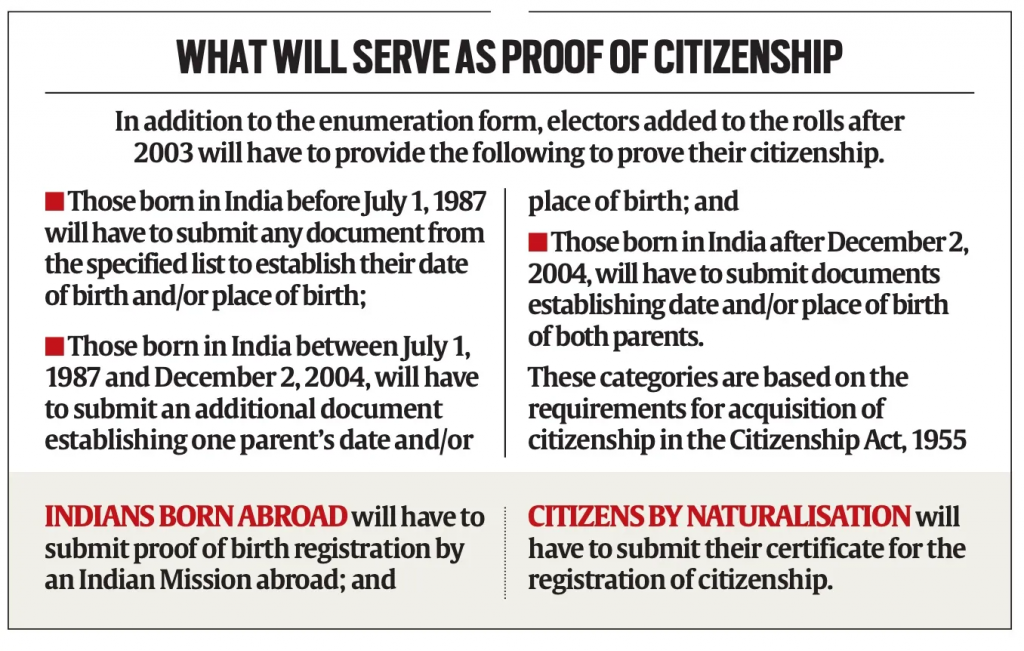Syllabus: GS2/Polity and Governance
Context
- The Election Commission of India (ECI) has asked for the electoral rolls for Bihar to be prepared afresh.
About
- All electors must submit an enumeration form, and those registered after 2003 have to additionally provide documentation establishing their citizenship.
- This special intensive revision (SIV) of rolls will eventually cover all states and Union Territories.
- Reasons for the SIV: Rapid urbanisation, frequent migration, young citizens becoming eligible to vote, non-reporting of deaths and inclusion of the names of foreign illegal immigrants have necessitated the conduct.
- The booth level officers (BLOs) will make house to house verification of voters.
- The last intensive revision for Bihar was conducted by the Commission in 2003.

Provision in RPA
- As per the Section 21(3) of The Representation of the People Act, 1950 the Election Commission “may at any time… direct a special revision of the electoral roll for any constituency or part of a constituency in such manner as it may think fit”.
- The revision of rolls can be carried out “either intensively or summarily or partly intensively and partly summarily, as the (ECI) may direct”.
- In an intensive revision, the electoral roll is prepared afresh and in a summary revision, the roll is amended.
- Intensive revisions have been carried out in 1952-56, 1957, 1961, 1965, 1966, 1983-84, 1987-89, 1992, 1993, 1995, 2002, 2003 and 2004.
Eligibility to be a Registered Voter in India
- Article 326 of the Constitution stipulates that: every person who is a citizen of India & who is not less than 18 years of age on the qualifying date & is not otherwise disqualified under any law shall be entitled to be registered in the electoral roll.
- Section 16 of the Representation of the People Act, 1950 disqualifies a person from being registered on an electoral roll if:
- they are not a citizen of India,
- are of unsound mind, as declared by a competent court, or
- are disqualified under any law relating to corrupt practices or offences in connection with elections.
Procedure for Voter Registration
- The Election Commission of India (ECI) mandates new voters to apply using Form 6.
- Applicants must submit:
- Self-attested proof of age and address (such as utility bills, passport, etc.)
- A declaration of Indian citizenship, which they must personally sign.
- Proof of citizenship (such as passport or birth certificate) is not strictly required unless the ERO suspects the applicant’s credentials.
- Electoral Registration Officers (EROs) and Booth Level Officers (BLOs) are responsible for verifying the applications. The process includes:
- Verification of documents,
- Hearings for claims and objections,
- Acceptance or rejection of the application.
- Section 31 of the RP Act, 1950 penalizes false declarations in voter applications.
| About Election Commission of India (ECI) – The ECI is an autonomous and permanent constitutional body responsible for organising free and fair elections in the Union and States of India. – The Constitution grants the ECI with the power of direction, superintendence, and control of elections to Parliament, state legislatures, the office of president of India and the office of vice-president of India. – The ECI does not deal with the elections to the urban bodies such as Municipalities and Panchayats in the states and hence, a separate State Election Commission is in place. |
Source: IE
Previous article
The United Nations at 80
Next article
Micro, Small and Medium Enterprises (MSMEs) Day 2025